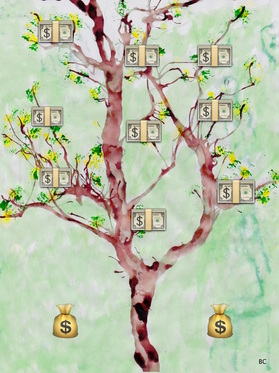My Indiegogo campaign to publish "I AM THE HUGGER!" ended on 11/2/16!
https://igg.me/at/IAMTHEHUGGER
"I AM THE HUGGER!"
CAMPAIGN LINK HERE: https://igg.me/at/IAMTHEHUGGER
|
My Indiegogo campaign to publish "I AM THE HUGGER!" ended on 11/2/16! https://igg.me/at/IAMTHEHUGGER
2 Comments
 My daughter leaves lights on, doesn’t close doors, forgets to close the refrigerator door and stays in the shower for way too long. I remind her that we pay for everything we use, but she still forgets. I am constantly harping, begging her to remember that not only does it save us money to remember these things, it’s the best way to conserve energy and resources for the whole world. Her hormones are raging, so I get it, but being a harpy gets old… One thing I don't say to my daughter is “Money doesn’t grow on trees!” I can’t count all the times my mother said it to me. I too forgot to close doors, turn off lights and water, and I was perpetually reminded that money didn’t grow on trees. Before I was mature enough to appreciate a good metaphor, I remember thinking it was a dumb expression, because, of course money doesn’t grow on trees! It’s been a cliche for a long time, but it highlights our disconnected relationship with the natural world. Our culture monetizes everything, and very little escapes exploitation for profit. While researching mother trees for the last blog I wrote, I learned about Robin Wall Kimmerer, plant ecologist, award-winning author, poet, and SUNY Distinguished Teaching Professor at the SUNY College of Environmental Science and Forestry in Syracuse, New York. Professor Kimmerer is a member of the Citizen Potawatomi Tribe and is the founding Director of the Center for Native Peoples and the Environment at ESF SUNY. I immediately reserved a library copy of her most recent book of essays: “Braiding Sweetgrass: indigenous wisdom, scientific knowledge and the teachings of plants” which was released in 2013, and was awarded the Sigurd Olson Nature Writing Award. I am overwhelmed by Kimmerer’s poetry, eloquence and wisdom. Weaving together science, indigenous wisdom, family history and personal experience is no easy feat, yet Robin Wall Kimmerer manages to create beautiful, moving and healing lessons with each and every sentence. I want to read this book over and over again. For several years Dr. Kimmerer has been studying the Potawatomi language, which nearly became extinct. At the time she began her studies, there were only 9 living speakers left in the world. Much of the Potawatomi culture was destroyed by government and missionary assimilation programs which plucked indigenous children from their tribal homes, and forced them into restrictive boarding schools where they were not allowed to speak their own languages. Dr. Kimmerer describes her joy in rediscovering the language of her grandparents as well as her delight in discovering the ways in which it holds the living world in a familial embrace. “So it is that in Potawatomi and most other indigenous languages, we use the same words to address the living world as we use for our family. Because they are our family.” Kimmerer calls it a language of animacy - a language that understands a world “full of being, full of unseen energies that animate everything.” In Potawatomi, when you take a walk in the woods, you are walking among the Birch, Pine or Maple people. If you climb the hills, you are with the Rock people; and down below, you may glimpse, at a bend in the river, the home of the Beaver people. Every day scientific research uncovers more evidence that organisms and systems are intricately connected and that small causes have large effects. Actions have consequences, but English is a language with more nouns than verbs, focusing more on things than actions. Western cultures are built on buying and selling, but indigenous cultures are built on “gift economies”. They are cultures of gratitude. Reciprocity and generosity are a given. Indigenous cultures have no need for money, and trees are people. I was raised speaking English, and what a wonderful language it is, but in so many ways, I agree with Robin Wall Kimmerer when she says, “… beneath the richness of its vocabulary and its descriptive power, something is missing, the same something that swells around you and in you when you listen to the world. Science can be a language of distance which reduces a being to its working parts, it is a language of objects.“ Imagine saying, “Money doesn’t grow on Grandma.” If we could all learn more of the language of animacy, we would gain a greater sense of connectedness as we stop our thoughtless exploitation of the natural world. When I finish “Braiding Sweetgrass” I’ll be reading Kimmerer’s earlier book “Gathering Moss”. I have a feeling I’ll want to read that one over and over again too. __________________________________________________________________________________________ In the meantime, I'm waiting for my patient, helpful, wonderful, 14 year-old nephew to finish some final video edits, and then I'll launch the Indiegogo campaign for "I AM THE HUGGER!", my picture book about trees and why they deserve our hugs. https://www.indiegogo.com/project/preview/74e0fcf2#/ |
Brenda CummingsThe Green Machine Archives
January 2017
|